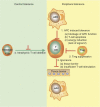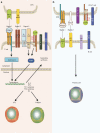Strategies to modulate immune responses: a new frontier for gene therapy - PubMed (original) (raw)
Review
. 2009 Sep;17(9):1492-503.
doi: 10.1038/mt.2009.150. Epub 2009 Jul 7.
Affiliations
- PMID: 19584819
- PMCID: PMC2835266
- DOI: 10.1038/mt.2009.150
Review
Strategies to modulate immune responses: a new frontier for gene therapy
Valder R Arruda et al. Mol Ther. 2009 Sep.
Abstract
The success of gene therapy strategies to cure disease relies on the control of unwanted immune responses to transgene products, genetically modified cells and/or to the vector. Effective treatment of an established immune response is much harder to achieve than prevention of a response before it has had a chance to develop. However, preventive strategies are not always effective in avoiding immune responses, thus the use of drugs to induce immunosuppression (IS) is required. The growing discovery of novel drugs provides a conceptual shift from using generalized, moderately intensive immunosuppressive regimens towards a refined approach to attain the optimal balance of naive cells, effector cells, memory cells, and regulatory cells, harnessing the natural tolerance mechanisms of the body. We review several strategies based on transient IS coupled with gene therapy for sustained immune tolerance induction to the therapeutic transgene.
Figures
**Figure 1
Mechanisms of T-cell regulation. APC, antigen-presenting cell.
**Figure 2
T- and B-cell activation. Overview of the major proteins and pathways involved in (a) T-cell activation by antigen-presenting cells (APCs) and (b) B-cell activation by CD4 T helper cells. CTL, cytotoxic T lymphocyte; IFN, interferon; IL, interleukin; TOR, target-of-rapamycin.
Similar articles
- Gene Therapy With Regulatory T Cells: A Beneficial Alliance.
Biswas M, Kumar SRP, Terhorst C, Herzog RW. Biswas M, et al. Front Immunol. 2018 Mar 19;9:554. doi: 10.3389/fimmu.2018.00554. eCollection 2018. Front Immunol. 2018. PMID: 29616042 Free PMC article. Review. - Emerging role of regulatory T cells in gene transfer.
Cao O, Furlan-Freguia C, Arruda VR, Herzog RW. Cao O, et al. Curr Gene Ther. 2007 Oct;7(5):381-90. doi: 10.2174/156652307782151506. Curr Gene Ther. 2007. PMID: 17979684 Review. - Immunology of neurological gene therapy: how T cells modulate viral vector-mediated therapeutic transgene expression through immunological synapses.
Lowenstein PR, Kroeger K, Castro MG. Lowenstein PR, et al. Neurotherapeutics. 2007 Oct;4(4):715-24. doi: 10.1016/j.nurt.2007.07.010. Neurotherapeutics. 2007. PMID: 17920552 Free PMC article. Review. - Liver induced transgene tolerance with AAV vectors.
Keeler GD, Markusic DM, Hoffman BE. Keeler GD, et al. Cell Immunol. 2019 Aug;342:103728. doi: 10.1016/j.cellimm.2017.12.002. Epub 2017 Dec 5. Cell Immunol. 2019. PMID: 29576315 Free PMC article. Review. - Antigen-specific tolerance of human alpha1-antitrypsin induced by helper-dependent adenovirus.
Cerullo V, McCormack W, Seiler M, Mane V, Cela R, Clarke C, Rodgers JR, Lee B. Cerullo V, et al. Hum Gene Ther. 2007 Dec;18(12):1215-24. doi: 10.1089/hum.2006.036. Hum Gene Ther. 2007. PMID: 18021020
Cited by
- Comparing the Benefits and Drawbacks of Stem Cell Therapy Based on the Cell Origin or Manipulation Process: Addressing Immunogenicity.
Chang SH, Park CG. Chang SH, et al. Immune Netw. 2023 Nov 23;23(6):e44. doi: 10.4110/in.2023.23.e44. eCollection 2023 Dec. Immune Netw. 2023. PMID: 38188600 Free PMC article. Review. - Gene therapy for cystic fibrosis: Challenges and prospects.
Sui H, Xu X, Su Y, Gong Z, Yao M, Liu X, Zhang T, Jiang Z, Bai T, Wang J, Zhang J, Xu C, Luo M. Sui H, et al. Front Pharmacol. 2022 Oct 11;13:1015926. doi: 10.3389/fphar.2022.1015926. eCollection 2022. Front Pharmacol. 2022. PMID: 36304167 Free PMC article. Review. - Investigating Immune Responses to the scAAV9-HEXM Gene Therapy Treatment in Tay-Sachs Disease and Sandhoff Disease Mouse Models.
Kot S, Karumuthil-Melethil S, Woodley E, Zaric V, Thompson P, Chen Z, Lykken E, Keimel JG, Kaemmerer WF, Gray SJ, Walia JS. Kot S, et al. Int J Mol Sci. 2021 Jun 23;22(13):6751. doi: 10.3390/ijms22136751. Int J Mol Sci. 2021. PMID: 34201771 Free PMC article. - Gene Therapy for Inherited Bleeding Disorders.
Arruda VR, Weber J, Samelson-Jones BJ. Arruda VR, et al. Semin Thromb Hemost. 2021 Mar;47(2):161-173. doi: 10.1055/s-0041-1722862. Epub 2021 Feb 26. Semin Thromb Hemost. 2021. PMID: 33636747 Free PMC article. Review. - Overcoming Immunological Challenges to Helper-Dependent Adenoviral Vector-Mediated Long-Term CFTR Expression in Mouse Airways.
Cao H, Duan R, Hu J. Cao H, et al. Genes (Basel). 2020 May 18;11(5):565. doi: 10.3390/genes11050565. Genes (Basel). 2020. PMID: 32443586 Free PMC article.
References
- Halloran PF. Immunosuppressive drugs for kidney transplantation. N Engl J Med. 2004;351:2715–2729. - PubMed
- Kamradt T., and , Mitchison NA. Tolerance and autoimmunity. N Engl J Med. 2001;344:655–664. - PubMed
- Thomas CE, Ehrhardt A., and , Kay MA. Progress and problems with the use of viral vectors for gene therapy. Nat Rev Genet. 2003;4:346–358. - PubMed
- Bessis N, GarciaCozar FJ., and , Boissier MC. Immune responses to gene therapy vectors: influence on vector function and effector mechanisms. Gene Ther. 2004;11 Suppl 1:S10–S17. - PubMed
Publication types
MeSH terms
LinkOut - more resources
Full Text Sources
Other Literature Sources
Medical

